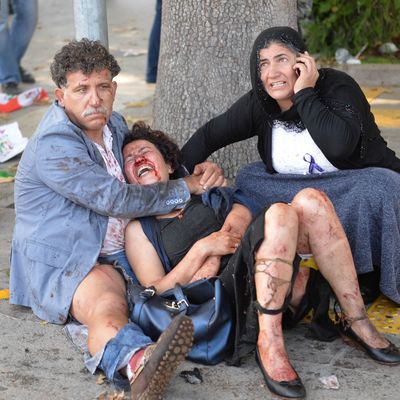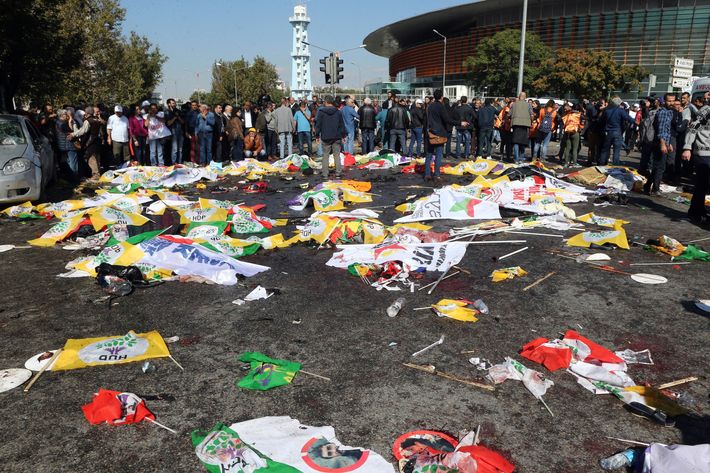
At least 97 people were killed and 400 wounded when two bombs were detonated at a peace rally in the Turkish capital of Ankara. It is already the deadliest terrorist attack in modern Turkey’s history, and the death toll may still rise. The two explosions targeted an area outside of the city’s central train station on Saturday morning, where hundreds of ethnic Kurds and leftists were protesting the growing violence between the Turkish government and the P.K.K. Kurdish militant group. According to the Guardian, the Turkish government is saying that it was the work of two suicide bombers, but it’s not yet known which terrorist group is behind the blasts, if the bomber or bombers were affiliated with one. There are also reports that a suspicious vehicle and suspicious package were found at the scene and bomb disposal experts were brought in, so obviously the story is still developing.
Here is a video of the moment the blast occurred:
As seen above, protesters, carrying banners and flags, were chanting and dancing when the blasts struck. Following the attack, those same protest banners were used to cover the dead, who lay in two circles around where the blasts had originated.

Officials in Ankara asked for blood donations to help treat the wounded, and Turkish president Recep Tayyip Erdogan and other political leaders cancelled all plans inorder to head to the city. Said Erdogan, “I strongly condemn this heinous attack on our unity and our country’s peace. No matter what its origin, aim or name, we are against any form of terrorist act or terrorist organisation. We are obliged to be against it together.”
According to the New York Times, many of Turkey’s Kurds are already blaming the Turkish state for the attack. Violence and tensions between the Turkish government and the P.K.K. have been on the rise for months following a resumption of hostilities after a recent, seemingly productive peace process. The new violence came as the Turkish government had simultaneously become a more collaborative ally in the U.S.-led fight against ISIS, opening up military bases to coalition airplanes and conducting airstrikes itself, some against ISIS and some against the P.K.K. As the Times points out, the failure of the peace process also coincided with the dramatic electoral gains of Kurd’s political wing, the H.D.P. party, in elections last June. In addition, another 32 Kurdish activists were killed in July when a bombing targeted a cultural center in the southeast Turkey town of Suruc. The Turkish government blamed the attack on ISIS, but most Kurds doubted that claim. Prior to the attacks in Ankara, the P.K.K. had announced a cease-fire in advance of the Turkish parliamentary elections which will be held in three weeks, and said they would only act in self-defense during that time. Concerns over security in the run-up to those elections had already been high before Saturday’s attack.
Following Saturday’s bombings, the Guardian notes that thousands of protesters spontaneously took to the streets in Istanbul to blame President Erdogan for the bombings and decry how the government was handling the aftermath. Turkish officials had instituted a temporary news blackout following the attack, which a government official said was to prevent panic among Turkish citizens. Many are also reporting that social media services have been blocked in the country, a now-routine response by Turkish authorities to any unrest.
Many analysts and Erdogan opponents and have long suspected the president of deliberately inflaming the conflict with the Kurds in order to expand and solidify more authoritarian power over the country. After all, the success of the H.D.P. in the last elections came at the expense of Erdogan’s parliamentary majority, and his A.K.P. party will need to defeat them in the upcoming elections if they want to regain it. Campaigning for that election has now been suspended following Saturday’s bombing, and combined with the new and expanded media blackouts, which are in addition to previous crackdowns, it’s understandable how Erdogan’s political opponents could suspect a conspiracy. In addition, some worry that far-right, ultra-nationalist groups in the country have links to government security forces, and that those groups are responsible for previous deadly attacks on the H.D.P.
Once considered a stalwart of stability in the middle east, Turkey has become increasingly unravelled amid internal strife, the neighboring conflicts in Syria and Iraq, an extraordinary influx of refugees, the threat of ISIS, and now, the renewed and increasingly violent conflict with the P.K.K. How Saturday’s bombings connect to these issues, or will now influence them, remains to be seen.
This post has been updated to reflect new information as it became available.






























